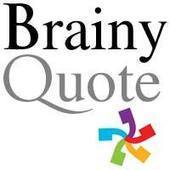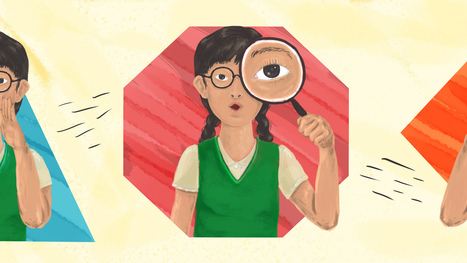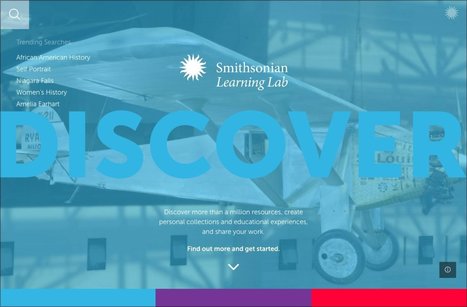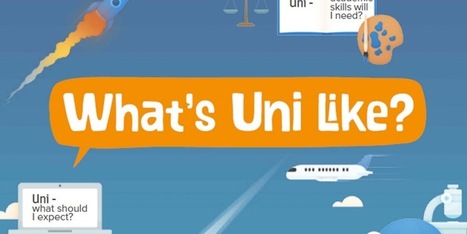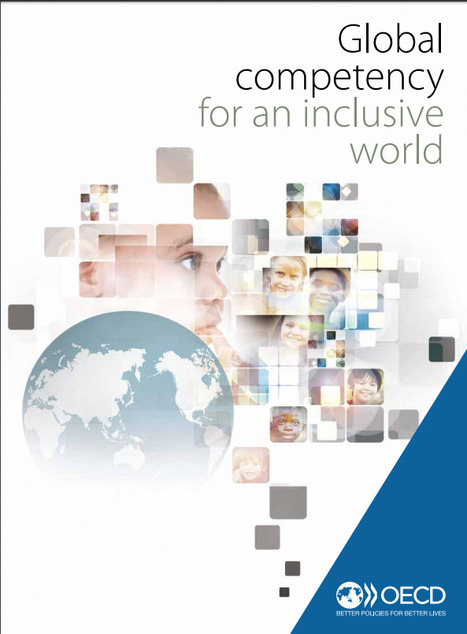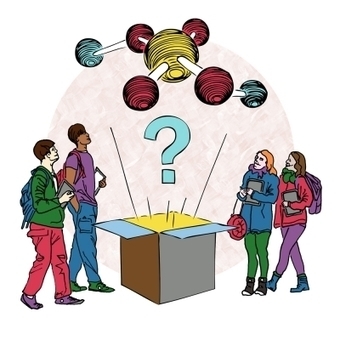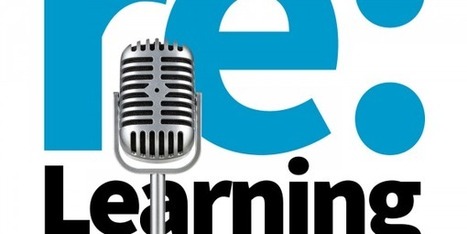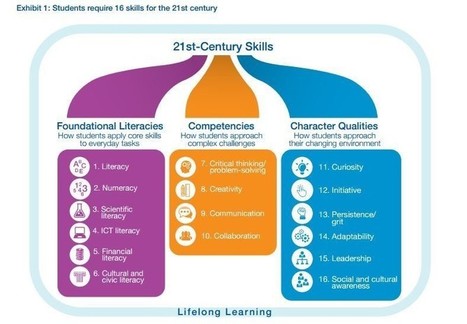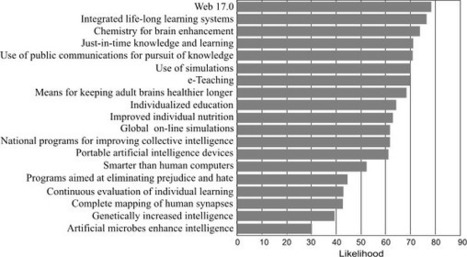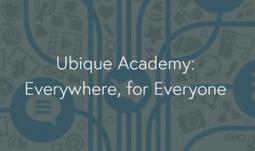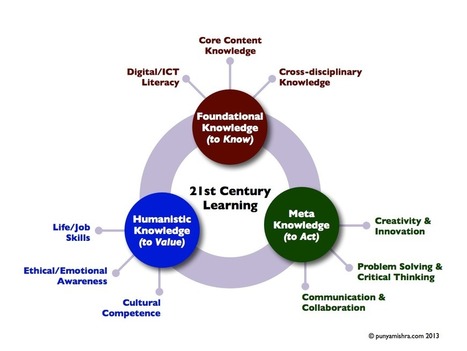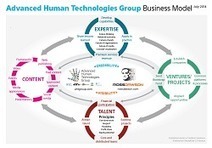 Your new post is loading...
 Your new post is loading...
The Neil deGrasse Tyson of education urges stakeholders to look at the bigger picture when trying to predict the future.
I think I very audibly sighed into my overpriced latte when a recent keynote speaker at Campus Technology’s Boston-based conference waxed poetic about how MOOCs and online learning are innovations changing everything in education. “Not this again,” I cynically mumbled to myself. “Not someone relatively new at philosophizing about education that’s discovered Khan Academy.”
Doing a complete 180º from yesterday, I practically choked on my overpriced now-macchiato this morning when keynoter Stephen Downes, program leader of Learning and Performance Support Systems for the National Research Council of Canada, almost verbatim mimicked my thoughts out loud: “The things most people think are innovations or ‘disruptors’ are not these things at all,” he explained. “If you take a Physics lecture and put it online that’s not transformative. What’s transformative is what happens when you realize the Physics lecture is not what students are really there for in the first place.”
Downes’ gist of his presentation was that keeping the same mentality about what students need from postsecondary education and why they need it is never going to bring about true innovation and transformation. In order to bring about these buzz words so commonly used in the education arena these days, educators and stakeholders must first understand the nature of prediction and the tools needed to predict the future.
"The task of a university is the creation of the future, so far as rational thought and civilized modes of appreciation can affect the issue." - Alfred North Whitehead quotes from BrainyQuote.com
Artificial intelligence is getting stronger. Education must adapt. Here's a framework for separating out the things schools can and should teach that are uniquely human.
IN JULY 2011 Sebastian Thrun, who among other things is a professor at Stanford, posted a short video on YouTube, announcing that he and a colleague, Peter Norvig, were making their “Introduction to Artificial Intelligence” course available free online. By the time the course began in October, 160,000 people in 190 countries had signed up for it. At the same time Andrew Ng, also a Stanford professor, made one of his courses, on machine learning, available free online, for which 100,000 people enrolled. Both courses ran for ten weeks. Mr Thrun’s was completed by 23,000 people; Mr Ng’s by 13,000.
Such online courses, with short video lectures, discussion boards for students and systems to grade their coursework automatically, became known as Massive Open Online Courses (MOOCs). In 2012 Mr Thrun founded an online-education startup called Udacity, and Mr Ng co-founded another, called Coursera. That same year Harvard University and the Massachusetts Institute of Technology got together to form edX, a non-profit MOOC provider, headed by Anant Agarwal, the head of MIT’s artificial-intelligence laboratory. Some thought that MOOCs would replace traditional university teaching. The initial hype around MOOCs has since died down somewhat (though millions of students have taken online courses of some kind). But the MOOC boom illustrated the enormous potential for delivering education online, in bite-sized chunks.
We all know education needs to change. It always has been changing, it always will, and will always need to have a critical lens applied to how and why it is changing. But with every new technology trend that gets re-purposed into the next savior of education, I can’t stop this gnawing feeling that our field is becoming a big gimmick to those outside of it.
A gimmick is basically just a trick intended to attract attention. One or two seem harmless enough. Well, not that harmful? But once everything that comes down the pipe starts become this trick to get people to look at education, the gimmick gets old. People are still asking what happened to Second Life, to Google Wave, to you name the trend. After a while, they stop buying into the notion that any of us know what we are talking about. Just think of the long-term effect on the larger discourse of so many people declaring so many things to be the savior of education, only to abandon each one after a year or two.
Unschooling is reaching way beyond the homeschool crowd. Traditional schools take note
With the onset of the so-called “new economy,” much of our educational systems is being questioned. With more than 40 percent of future work being independent contract work, what is the best way to learn or prepare for a career?
Most of us associate learning and career preparation with school. However, learning exists outside of the formal constraints of institutions. Whether it’s employment (on-the-job training), real world experiences, or travel, we understand that learning can be self-directed.
This realization has lead to an increase in what is often called unschooling, or even hacked education. Although often associated with homeschooling, unschooling is somewhat different. Homeschooling often uses set curriculum and instructional approaches, whereas true unschooling is directed by the learner.
The approach is unconventional, to be sure, but it recently gained more attention when Tesla/SpaceX founder Elon Musk created a learning alternative for his children embracing unschooling, self-directed learning tenets such as exploration, choice, natural life experiences, and visits to real world learning centers (museums, zoos).
Monday 4 July 2016 - Future Proof
Regardless of who wins the Federal election, the major issue facing Australians is the future of work.
There are startling and credible predictions that more than five million Australian jobs will simply disappear in the next 15 years, as a result of technology. That's 40% of the jobs that exist in Australia today.
What do you want to be when you grow up?
Answering that question is only going to get harder as many of the jobs our kids will do haven't been invented yet. And if parents believe that steering their kids towards "safe" professions like accountancy will guarantee them a job, they're in for a shock.
"Machine learning and artificial intelligence in particular are actually solving jobs that we thought traditionally were very highly qualified jobs, people like lawyers and doctors and accountants and bankers... It's eating out the middle of the job market." Robotics Pioneer
There will be winners and losers in some surprising areas as more and more jobs become automated or operated by intelligent computers.
Educators can now easily adapt the digital resources from one of the country's most prominent museums for their lessons with this week's launch of the Smithsonian Learning Lab.
After five years of development, the Smithsonian Center for Learning and Digital Access has released the full version of its free Learning Lab site, created to make the museum's multimedia resources more accessible for teachers.
"In the past, the digitized collections objects were in one place, the education resources were in another, the videos were in another, and the Smithsonian had not pulled those together in one way," said Darren Milligan, the Learning Lab's project director.
The online toolkit allows users to both find and create collections for their lessons by drawing from teaching materials and digitized Smithsonian objects via the "Discover," "Create" and "Share" tools. According to the center, annotations, quizzes and assignments can also be created, along with other interactive learning activities.
Event Description
Join us as Josu Abrego-Sanz from Charles Sturt University offers an overview of the newly created Massive Open Online Course (MOOC): What’s Uni Like? The session will include time for discussion, as well as the opportunity for networking following the event.
What’s Uni Like? is a MOOC in which participants build pre-tertiary achievement levels and explore aspects of the transition to university. The course addresses the key areas of student expectations, transition to university life, academic writing and reading, digital literacy and online learning skills. As a non-branded course, it promotes university study in general. The course is free-of-charge, easily accessible and self-paced.
Please feel welcome to share the invitation with anyone from your institution who would benefit from learning about this fantastic resource.
In 2016, new kinds of university will emerge, mobilising some of the world’s 150 million students to work on the our most pressing problems, says Geoff Mulgan
The education landscape is changing. On The Chronicle of Higher Education’s Re:Learning podcast, you’ll meet the renegade teachers, ed-tech entrepreneurs, longtime educators, and others shaping the future of college. This is part of our broader coverage of the future of education. For updates, follow the Re:Learning project on Twitter, Facebook, and iTunes.
New report outlines how the wearables market is set to grow through 2020
Research and Markets has announced the addition of the “Global Classroom Wearables Technology Market 2016-2020” report to their offering.
The report forecasts the global classroom wearables technology market to grow at a CAGR of 36.57 percent during the period 2016-2020.
To calculate the market size, the report considers the revenue generated from sales of classroom wearables technology devices such as smart glasses, smart watches, fitness trackers, wearable cameras and VR head gears.
The product segments considered to determine revenue generated are the following:
Wrist-worn equipment
Head gear
|
EMILY DUGGAN, 16, spends most afternoons at a dance studio tucked behind a shopping plaza near her home in Exeter, New Hampshire. Blond and doe-eyed, Duggan has been dancing since she was two, everything from tap to ballet. She puts in about 12 hours a week at the studio, including classes and rehearsals with the dance team for weekend competitions. Duggan also prides herself on getting good grades in school. But two years ago, the stress of managing both dance and academics overwhelmed her.
She was exhausted and losing weight. Some nights, Duggan faced four hours of homework after a day of school and dancing that stretched into the evening, “I would just break down crying and saying, ‘I can’t do this anymore!’ ” she recalled.
Her parents agreed. In January 2015, Duggan enrolled in New Hampshire’s self-paced Virtual Learning Academy Charter School, joining about 200 full-time middle and high school students and about 10,000 part-timers from brick-and-mortar schools statewide who take online VLACS courses a la carte. There is no entrance exam, screening or application required to attend VLACS, which is free for any New Hampshire student.
Children need to learn social and emotional skills if they are to thrive in the workplace of the future, a World Economic Forum report has found.
The new research shows that as the digital economy transforms the workplace, Social and Emotional Learning (SEL) skills such as collaboration, communication and problem solving will become ever more important as more traditional roles are mechanized.
With more than half of children now entering school expected to work in jobs that don’t yet exist, adaptability is becoming a core skill. Children must learn social and emotional skills if they are to thrive in the workplace of the future, a new report says.
In the future, if not now, we will get the bulk of our outside information from social media. It will (and has begun to) take the place of the news networks, doing their job for them. Witness news programs that highlight the latest viral YouTube video as a segment in itself.
How can social networking be redeemed for in-classroom use? Does it even need to be?
Certainly, strict supervision and filtering tools are in order, but are not fail-proof. Still, we don’t always give the idea of collaboration through the digital medium enough credit.
The fact that we as a generation are grappling with the pitfalls of social networking creates even more of an urgency for us to teach our kids “how to do it right.” That’s where digital citizenship comes in.
If you met this lab-created critter over your beach vacation, you'd swear you saw a baby ray. In fact, the tiny, flexible swimmer is the product of a team of diverse scientists. They have built the most successful artificial animal yet. This disruptive technology opens the door much wider for lifelike robots and artificial intelligence.
Like most disruption, it started with a simple idea. Kit Kevin Parker, PhD, a Harvard professor researching how to build a human heart, saw his daughter entranced by watching stingrays at the New England Aquarium in Boston. He wondered if he could engineer a muscle that could move in the same sinuous, undulating fashion. The quest for a material led to creating an artificial ray with a 3-D-printed rubber body at the School of Engineering and Applied Sciences at Harvard. Scientists from the University of Illinois at Urbana-Champaign, the University of Michigan, and Stanford University's Medical Center joined the team.
They reinforced the soft rubber body with a 3-D-printed gold skeleton so thin it functions like cartilage. Geneticists adapted rat heart cells so they could respond to light by contracting. Then, they were grown in a carefully arranged pattern on the rubber and around the gold skeleton.
The muscular circuitry is one of the most interesting parts of the research, and there's more about it in this video:
The Millennium Project has conducted the study Education and Learning Possibilities by the Year 2030 in 2006-2007. The inputs were collected using the Real-Time Delphi technique.
The purpose of the study was to provide a global picture of potential futures of education and learning, which were to be used as an input to the new Vision of Korea for 2030 report to the Ministry of Education. However, our study addressed education in a global sense, not specific Korean issues as such. The results of the study were published in the State of the Future. and are also available on the Global Futures Intelligence System website (under "Research", select 'Education and Learning 2030'. Following is a short overview and summary of the results.
Ubique Academy would have four learning hubs throughout the city, with students pursuing much of their learning in community spaces, such as museums, libraries and maker spaces. Learning pathway designers would help students craft personalized pathways that met their needs and reflected their interests.
“The vision for Ubique Academy is for students and families across Indianapolis to experience learner-led, passion-based, real-world personalized learning that meets students where they are,” said Katherine Prince, KnowledgeWorks’ senior director of strategic foresight. “The Mind Trust’s 2016 School Design Competition has given us a great opportunity to explore how we might bring the future to life by translating our forecasts to the present day.”
Yesterday's graphic designers are today's UX designers. Will tomorrow's UX designers be avatar programmers, fusionists, and artificial organ designers? Yes, according to the illustrious roster of design leaders we spoke with here.
Design has matured from a largely stylistic endeavor to a field tasked with solving thorny technological and social problems, an evolution that will accelerate as companies enlist designers for increasingly complex opportunities, from self-driving cars to human biology. "Over the next five years, design as a profession will continue to evolve into a hybrid industry that is considered as much technical as it is creative," says Dave Miller, a recruiter at the design consultancy Artefact. "A new wave of designers formally educated in human-centered design—taught to weave together research, interaction, visual and code to solve incredibly gnarly 21st-century problems—will move into leadership positions. They will push the industry to new heights of sophistication."
Here are 18 of the most important design jobs of the future, as identified by the men and women who will no doubt do much of the hiring. Most looked three to five years out, but some peered farther into the future (see: organ designer).

|
Suggested by
Kim Flintoff
|
3 Knowledge Domains For The 21st Century Student
Is university for me? What should I expect at university? What academic skills will I need?
What’s Uni Like? is a free, self-paced, online course that answers all your questions about
going to university.
It’s easy to get started!
Select register and enrol.
The course will show you the many ways of getting into uni.
Have fun!
The following blog post comes from the new book by Julie Lindsay, "The Global Educator: Leveraging technology for collaborative learning and teaching" published by ISTE.
It’s one thing for today’s students to connect with the world and to appreciate the diversity and significance of potential interactions through everyday, real-time interaction. It is a whole different challenge to be able to collaborate with learning partners across town — or around the world.
The latter, in truth, is what all educators and learners should be aspiring toward, but the reality is you cannot run before you can walk. Unless educators understand and experience the power of using digital technologies for online collaboration in a local context first, it is likely that jumping head-first into global contexts — with its myriad challenges — will not be successful.
Emerging approaches to digital scholarship question what knowledge is, how it is gained, and how it is shared. Digital technology provides for differentiation, accountability, and visibility in the learning process. For collaborative learning, the internet provides the platform for engaged learning, deeper understanding, and some exciting outcomes.
Keynote speaker Ross Dawson is globally recognized as a leading futurist, entrepreneur, strategy advisor, and bestselling author.
In giving this technology to instructors, the goal is “to give faculty an understanding of who is speaking, where, when, and how, so they can incorporate more active learning into the classroom,” Ogan said.
Teachers receive a dashboard that displays data about classroom activity, which helps determine how their actions are impacting student outcomes. The dashboard displays different lights, such as red and green lights, that correspond to how teachers might want to change or continue their teaching approach.
|
 Your new post is loading...
Your new post is loading...
 Your new post is loading...
Your new post is loading...







